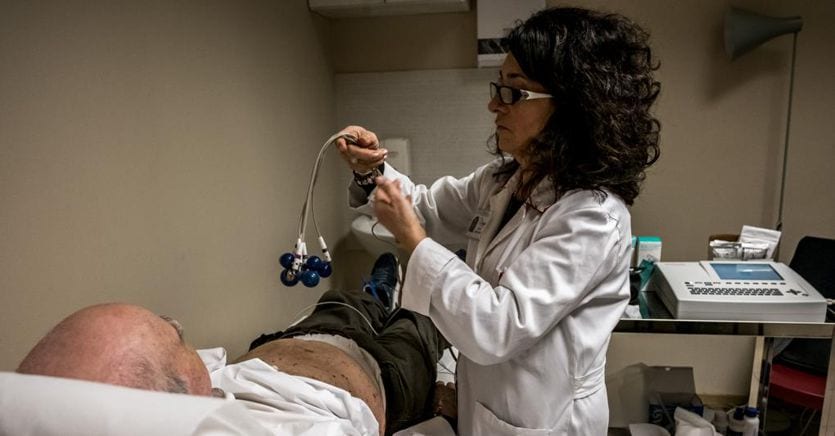Hospitalizations collapsed by 30-40%, mortality from heart attack tripled, first visits down by more than 20% and checkups that mark a sharp -30%. Adherence to therapies – which in many cases marks the distinction between saving one’s life or not – dropped to below 50%.
Cardiovascular diseases, the leading cause of death in the world with 18.5 million lives lost a year and the first cause also in Italy for both men (31.7%) and women (37.7%) with 230 thousand deaths certified by Istat, after 18 months of pandemic denounce a real war bulletin. Without a turnaround on prevention and treatment models, the future promises to be black, after the turnaround caused by Covid with respect to the progress of recent decades: by 2030 an estimated 24 million deaths worldwide a year from cardiovascular causes, plus of 66,000 on average per day and for a global cost that will rise from around 863 billion dollars in 2010 to over 1 trillion, more than the GDP of the Netherlands, Switzerland, Sweden or Turkey.
World heart day
And so on the occasion of the World Day which on 29 September 2021 celebrates 20 years with a red alert budget, calls for primary prevention – banning smoking, healthy nutrition and physical activity – but also secondary with regular management are multiplying. visits and therapies. And we need a review of the models of care that look at telemedicine and a new role for the territory.Easier said than done: the pandemic in the early days of Covid literally barred the doors to the sick and potential patients: if not reconversion of beds, it was the fear of contagion or the real impossibility of accessing hospitals that delayed timely diagnosis and taking charge, which for these pathologies are lifesaving. But the pandemic also meant desperately seeking new assistance strategies and in this case too, remote care, on which the National Recovery and Resilience Plan in the Health chapter focuses, has undergone a decisive change of pace.
Loading…
The two priorities
Trials, innovative projects closer to the patient and his needs are now open construction sites on which world and Italian cardiology is working.Two priorities to protect the heart: restart immediately with screenings, treatments and check-ups, and give wings to organizational innovation. The patient makes the difference: “Use your heart to stay connected with your heart”, is the slogan of the Italian Foundation for the Heart (Fic), which urges citizens to follow a correct lifestyle, to be aware of possible symptoms cardiovascular disease and to stay in contact with your doctor at all times. “75% of recurrent cardiovascular events could be prevented”, says Paolo Magni, coordinator of the Fic Scientific Committee and professor of Pathology at the Department of Pharmacological and Biomolecular Sciences at the University of Milan “. And technological development can do a lot – explains Fic president Emanuela Folco -. Digital networks have the power to keep patients connected with families, friends, other patients, caregivers and doctors. We use technology – to prevent people with cardiovascular disease from feeling isolated and alone. At the same time, each of us is personally responsible for the daily lifestyle and for the recognition of signs and symptoms that require medical examination ”.
Secondary prevention
The first national secondary prevention campaign “Do not forget your core” comes from the hospital cardiologists of the Anmco, aimed at those who have had a heart attack or revascularization in the last year and are approaching the expiry of the treatment plan: until November 30 – in compliance with Covid protocols – it will be possible to book a free specialist check-up at the Foundation for your heart with 110 cardiologists from 31 cardiologies working in 27 cities in 12 regions. And where the virus still hinders access, telemedicine will be used. The alert in hospitals is still high but the numbers of the “heart pandemic” certainly do not allow us to let our guard down, as explained by Michele Gulizia, President of the Foundation for Your Heart and Director of Cardiology at the Garibaldi-Nesima Hospital in Catania: “The epidemiological burden of Covid-19 has led to a 30-40% reduction in hospitalizations for acute coronary syndrome and heart failure, pathologies that alone represent the majority of cardiological hospitalizations, with a more than 3-fold increase in mortality for Stemi myocardial infarction, which increased from 4.1 to 13.7%. But cardiovascular disease still remains the leading cause of death today: this reduction in screening activities will have important repercussions in the coming months and certainly also for the next few years. Hence the Anmco Foundation for Your Heart has decided to support as many cardiological consultations as possible ”.
The telemedicine chance
Given the difficulty of patients to access visits, during the pandemic the majority of doctors (90% of specialists and 95% of general practitioners) according to an IQVIA study promoted by Sanofi in collaboration with the Italian Heart Foundation tried to maintain contact with patients by phone, via whatsapp and email, to share clinical exams, monitor therapies and patients’ health conditions. They were mostly spontaneous initiatives, implemented above all with younger patients and with chronic diseases, but – albeit less frequently – with older patients. Doctors would like to continue: 63% hope that a more structured remote contact can be defined in the future, prefiguring a new integrated model of taking charge that provides for the possibility of maintaining contact even at a distance (for check-ups, examinations o renewal of therapeutic plans), thus fostering greater continuity of care and therapeutic alliance.In the Regions, digital clinics and telemedicine platforms are being equipped to guarantee multispecialist visits and consultations and guarantee integrated and personalized assistance. While hospital cardiologists deem it necessary to invest in personnel (doctors and nurses) to support the system and guarantee access and continuity of care, to involve family doctors and local specialists in patient management, to develop tools to follow patients at a distance.
